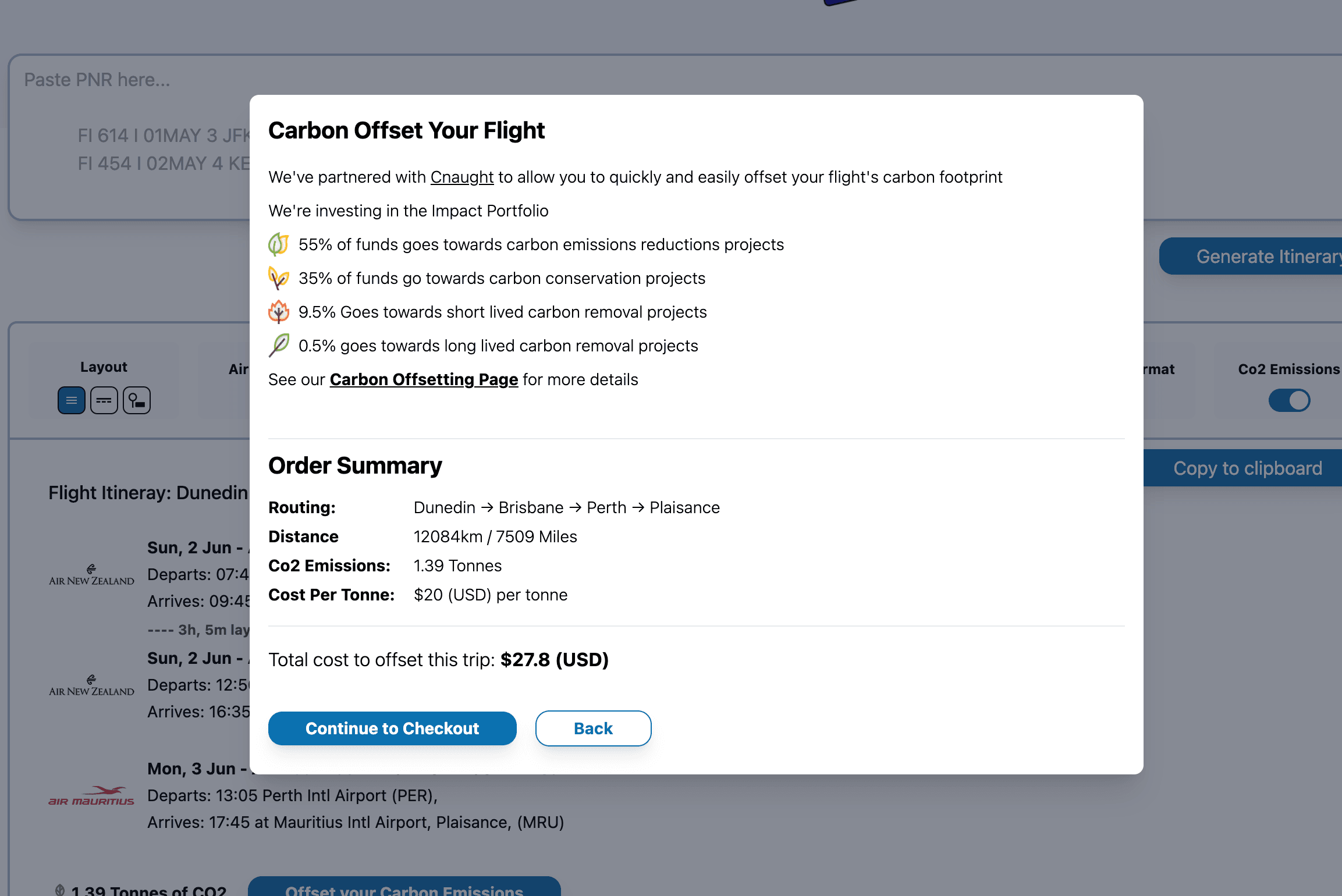
Carbon Offset your flights
with PNR Expert
Carbon Offsetting your flights
In an age where climate change poses one of the greatest challenges to our planet, taking proactive steps to mitigate our carbon footprint is more important than ever.
Air travel contributes significantly to global CO2 emissions, a leading cause of climate change. By carbon offsetting your flights through PNR Expert, you contribute to projects that reduce greenhouse gases, such as reforestation, renewable energy initiatives, or community-based projects in developing countries.
Why offset your flights with PNR Expert?
When you offset your flight carbon emissions with PNR Expert you can be safe in the knowledge that your money is going towards projects that are making a real difference.
- PNR Expert has partnered with Cnaught to give you access to Oxford-accredited carbon-offsetting projects.

- Each offset order includes a downloadable certificate of voluntary carbon action with a QR code you can scan to view the projects you've supported.

- PNR Expert ensures that 100% of your funds go directly to the intended projects, with no additional fees or markups. Your entire contribution is used exactly as intended.

- Generate an accurate quote directly from the PNR you enter, making it effortless to incorporate into your workflow.


How to offset your flights?
Offsetting yours or your client's flights with PNR Expert is easy.
Once you've converted your the PNR into the format of your choice, simple click on "Offset Your Carbon Emissions" button.
You will then be taken to a summary of your flight emissions where you can view the amount of CO2 being offset, as along with the cost.
Carbon offsetting with PNR Experts is charged at a simple $20 per tonne. We don't charge any additional fees.
Proceed through the checkout process and receive your Certificate of Voluntary Carbon Offset.
Where does your money go?
We've parnered with Cnaught's impact portfolio.
The Impact Portfolio is a collection of top-tier carbon credits, specifically selected to enhance environmental impact, minimize risks, and promote innovation.
This methodical approach to carbon credit management is advocated by the World Economic Forum and adheres to the scientific recommendations of Oxford’s Principles for Carbon Offsetting.
Incorporating the full range of carbon credit varieties offered by CNaught, the Impact Portfolio enables its clients to significantly contribute to the progression of a low-carbon future.
The Impact Portfolio is comprised of four categories of carbon credits, each of which is designed to address a different aspect of climate change.
Emissions Reductions
Conservation
Short Lived Carbon Removal
Long Lived Carbon Removal
Breakdown of carbon funds by project type
Emissions Reductions
Emissions reduction programmes encompasse a diverse array of initiatives designed to minimise and prevent emissions.
Such initiatives include generating renewable energy, eliminating refrigerants that would typically be released into the atmosphere, and capturing methane released from landfills.
Emissions Reductions projects we support

Istanbul Landfill Gas to Electricity Project
This project supports collection of landfill gas and generation of more than 51MW of electricity at the Odayeri and Komurcuoda landfill sites near Istanbul in Turkey.
Like most landfills, these sites throw off methane as some of the waste decomposes.

Gaziantep Landfill Gas Project
This project collects landfill gas to generate 5.655MW of electricity at a landfill serving Gaziantep City, Turkey.
This avoids the emission of methane (a potent greenhouse gas) into the atmosphere and using the methane to generate power and displace dirtier fossil-fuel-driven power in the electric grid.

Fuzhou Hongmiaoling Landfill Gas to Electricity Project
This project collects landfill gas to generate 2.5MW of electricity at a landfill in southeastern China.
This avoids the emission of methane (a potent greenhouse gas) into the atmosphere and using the methane to generate power and displace dirtier coal-fired power in the electric grid.
Conservation
Carbon conservation programmes include projects focused on preserving natural carbon storage sources that are under threat.
Examples include protecting rainforests from deforestation for development purposes or conserving peat bogs that are in danger of being drained for agricultural use.
Conservation projects we support

Rimba Raya Biodiversity Reserve
The Provincial government planned to convert the Central Kalimantan Peatlands, which can store 20x more carbon than typical forests, into palm oil estates.
This project protects these natural carbon sinks that would have otherwise been drained and logged and creates a physical buffer along the world-renowned Tanjung Puting National Park’s eastern border offering sanctuary to countless plant and animal species.

Katingan Mentaya Project
One of the highest-regarded avoided deforestation projects in the world, this project protects and restores 149,800 hectares of peatland ecosystems in Indonesia that would likely otherwise have been converted to palm and other plantations.
Short Lived Carbon Removal
Short-lived carbon removal programmes include projects that remove carbon from the atmosphere for a short period of time.
Examples include planting trees, which absorb carbon dioxide as they grow, and restoring peatlands, which store carbon in the soil.
Short Lived Carbon Removal projects we support

Kootznoowoo Native Community Forestry Project
A relatively small North American forestry project, Kootznoowoo protects 20,159 acres of forest across four areas on Prince of Wales Island, Alaska.

TIST Program in Uganda
One of the oldest and most successful reforestation projects ever undertaken, TIST partners with thousands of small landowners and subsistence farmers in Uganda to plant a mixture of native trees, food bearing trees, and commercial trees in areas that have been substantially deforested.

Delta Blue Carbon
The largest restoration project in the world, Delta Blue seeks to restore 225,000 hectares of land through large-scale mangrove restoration on the Indus Delta in Pakistan.
Long Lived Carbon Removal
This category encompasses a wide range of innovative projects characterized by advanced engineering. These projects offer great potential but are currently not widely implemented
Notable examples are technologies for capturing carbon dioxide directly from the air and methods for storing carbon by accelerating the natural weathering process of rocks.
Long Lived Carbon Removal projects we support

Frontier Carbon Removal Portfolio
Frontier is an advance market commitment to buy $1B+ of permanent carbon removal between 2022 and 2030.
It aims to accelerate the development of carbon removal technologies by guaranteeing future demand for them. The goal is to send a strong demand signal to researchers, entrepreneurs, and investors that there is a growing market for these technologies.

Charm Industrial Bio Oil
Charm collects waste from plants that have captured carbon dioxide from the atmosphere, applies a heating process called pyrolysis that converts the plant waste into bio-oil, and injects that bio oil into deep wells or caverns where it hardens and will be stored permanently instead of being released to the atmosphere as the plants decay.
How we calculate carbon emissions?
Calculating carbon emissions for a flight is not an exact science. There are many factors that go into calculating the carbon footprint.
Variables include type of aircraft, number of passengers, distance flown. Our calculations are based on the following:
- • Every KM flown in economy emits 0.115kg of CO2 per passenger.
- • Premium Economy is calculated at 1.3x the economy amount.
- • Business class is calculated at 2x the economy amount.
- • First class is calculated at 2.9x the economy amount.
We'll update this page when we have more information about our climate pledge
Our website carbon offsetting
PNR Expert is in the process of becoming a certified carbon neutral website.